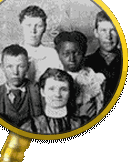1. This lesson chose to focus on John Wanamaker's Department Store, but many others existed in both Philadelphia and nationwide. Have students compare Wanamaker's to another major department store in another city during the same time period; perhaps Marshal Field's in Chicago or Macy's in New York. 2. For the Wanamaker's Advertising Extravaganza Assignment, students could also present their advertisements to other students and ask them to rate the ads through "student surveys." Ratings on a scale of one to five could be based upon the following questions: How well the ad convinced customers to shop at Wanamaker's, how interesting was the overall ad, did you find the slogan interesting, and did the ad tell you anything about the history Wanamaker's store? After surveying about twenty students, the survey results can be tallied and converted into graph form, showing how well their ads worked in persuading the public. 3. Students could visit Wanamaker's original department store (now Macy's) at 1300 Market Street in Philadelphia, PA. There, they could visit some of the remaining landmarks leftover from Wanamaker's store, such as the Eagle Statue, the Grand Court, and the Wanamaker Grand Court Organ. Students could photograph themselves at these landmarks and present a collage of them on poster-board, with a brief history or written response to them as captions to the pictures. 4. This lesson has focused on the development of the department store. Many people today, however, are using the internet to shop. How do you think this is impacting department store sales? What do you think the shopping trend of the future will be? 5. Ask students to do some independent research on John Wanamaker and report on various aspects of his life. Not only was Wanamaker a pioneer merchant, he also was religious, the United States Post Master General, and had a brief career in politics. What were some of his accomplishments in these respective fields?
Kirby Hall
Lafayette College
Easton, Pennsylvania 18042
(610) 330-5000
Fred Morgan Kirby created his "five and dime" stores to sell a wide variety of low-priced goods in small towns and cities across Pennsylvania. Kirby met up with F.W. Woolworth, who first came up with the idea of selling a line of goods at the then remarkably low price of five cents. The novelty at selling goods at fixed low prices was a radically successful idea, particularly since prices so low eliminated the need for the traditional haggling over prices. Eventually, other goods priced at ten cents appeared, creating the "five and ten" cent stores. In 1884, Kirby opened his first store in Wilkes-Barre with Woolworth's brother, Charles Sumner Woolworth. In twenty-five years, Kirby had over ninety-six stores, that paralleled those of F.W. Woolworth's own "five and ten" cent chain. In 1911, he finally sold his stores to Woolworth, who brought them into his own 596 store empire. Until 1938, Kirby functioned as a vice-president of Woolworth's company and served on its board of directors. Like Wanamaker, he changed the way American's shopped by eliminating haggling through a one-price system. He also went out of his way to market his goods through attractive window displays and careful in-store merchandizing. Kirby Hall in Wilkes-Barre is just one of many examples of the donations made by Kirby to Lafayette University after his financial success. It was constructed to house the Government and Law Department and during its construction in the late 1920s it was rumored to be per square foot the most expensive building of its day.
Macy's
(Formerly John Wanamaker's)
1300 Market Street
Philadelphia, Pennsylvania 19107
(215) 241-9000
The present Macy's Department Store is located within the Wanamaker building, which used to house John Wanamaker's department store. The building itself historically dates from 1911 and much of its beautiful, original architecture remains intact. No tours of the building are provided and any interest in bringing a school field trip to the store would have to be approved by Macy's management.




